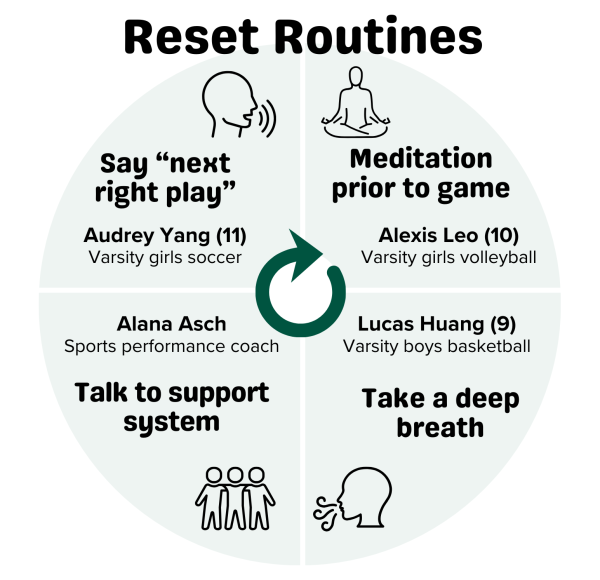
With a clear path to the basket and no defenders ahead, varsity boys basketball player Lucas Huang (9) drives down the court, spectators urging him on loudly. His steps slow as he sets up the shot and sends the ball arcing towards the hoop. Clang. The ball bounces off the rim, and the opponent rebounds it. As the crowd’s cheers fade, so does Lucas’ composure. His mind reels, his shaking hands misplacing pass after pass: What went wrong?
“A lot of the time, I can hit that mental roadblock, and when I do, my performance just decreases,” Lucas said. “Getting discouraged is probably the most common thing that will happen if you play a sport. When you get over that hump and find more of your confidence, that’s when you find out what you can really do.”
As athletes compete at higher levels of their sport, the constant pressure from not only coaches and parents but also themselves can have a severe effect on their game. Each tournament, game and even training begin to weigh heavily on a player’s future. A misplaced pass or accidental foul can spark a cycle of negativity that casts its shadow on every play.
Even before the first whistle, a wide variety of factors can impact an athlete’s focus and attitude in approaching the match. Distractions, from a difficult math test to a conflict with friends, can cloud their concentration, leading to mistakes that fuel frustration and self-doubt, which only pull players further from optimal form.
“Before each game, I’m always nervous because I don’t know how good the other team is going to be,” varsity girls soccer player Audrey Yang (11) said. “Sometimes, when I’m injured or had a bad day, I make a lot of mistakes during the game, and my mentality drops. But my teammates are always there encouraging me, which helps me get me back to my strong mentality.”
In team sports like soccer and basketball, teammates play an important role in uplifting each other and bolstering confidence. Individual sport athletes can also rely on a strong support system through coaches, family or friends to help them develop mental fortitude.

Youth sports performance coach Alana Asch, who works with Female Footballers to promote mental health awareness in sports, emphasized the importance of building nurturing connections in athletics.
“One of the big things that I don’t think a lot of people talk enough about is relationships,” Asch said. “Not just a significant other, which is what people usually think of, but just any of the people that you surround yourself with. That could be a mentor in sports or in any aspect of life.”
While having a trusted person to turn to can alleviate the long-term psychological stress of sports, Asch also highlights techniques athletes can implement during a game to combat the spread of negative emotions that hinder their performance. As a mentor for young soccer players, Asch teaches skills like paced breathing, journaling and reset routines to help players remain calm in the heat of the match.
“A reset routine can catch a bad thought,” Asch said. “We can’t necessarily always control our first thought, but we can control our second thought and our third thought. Let’s say I make a bad pass, and I think I’m the worst player in the world. If I continue to play soccer thinking about those things, I’m not gonna play well. The point is to do something that’s gonna get me into the present moment right after that.”
Reset routines are specific and intentional actions athletes can implement to break the cycle of self-criticism after making a mistake. A player might brush their shorts or adjust their ponytail while repeating a mantra like “next right play” to regain control of their emotions. Although the rituals are usually simple and performed on the field between plays, varsity girls volleyball player Alexis Leo (10) takes a pre-match approach to clearing her mind for games.
“My routine is, first of all, to not touch any devices before I go to sleep,” Alexis said. “An hour before, I don’t do any electronics: no TV, no phone. In the day, if I’m doing really bad, I take a moment for quiet meditation.”
Regardless of the regimen, Asch stresses the idea of practicing the routine just like any other skill in a sport. While they might feel awkward at first, with constant reinforcement, these rituals can become habits that surface intuitively during matches.
“The hardest part is remembering in the moment, and that’s why it’s so important to do that right now,” Asch said. “When you’re kind of by yourself, and you’re calm, and you’re in a relaxed state, that’s when you want to work on it, so that when you’re in that anxious state in the game, then it becomes more second nature.”
While building reset routines can serve as valuable preparation for when challenges arise, mental resilience is about more than managing emotions independently. Asch underlines recognizing when to look for support as a key towards athletic success.
“There’s a mentality in the sports world that’s very much, ‘No pain, no gain,’ and you have to fight through and keep going and keep pushing, even if you’re not okay,” Asch said. “But it’s completely valid and normal to not be okay. Reaching out for help or even just finding a coach, mentor, teacher or friend to talk to and letting them know that’s how you’re feeling—that’s a really big step.”




![LALC Vice President of External Affairs Raeanne Li (11) explains the International Phonetic Alphabet to attendees. "We decided to have more fun topics this year instead of just talking about the same things every year so our older members can also [enjoy],” Raeanne said.](https://harkeraquila.com/wp-content/uploads/2025/10/DSC_4627-1200x795.jpg)


















![“[Building nerf blasters] became this outlet of creativity for me that hasn't been matched by anything else. The process [of] making a build complete to your desire is such a painstakingly difficult process, but I've had to learn from [the skills needed from] soldering to proper painting. There's so many different options for everything, if you think about it, it exists. The best part is [that] if it doesn't exist, you can build it yourself," Ishaan Parate said.](https://harkeraquila.com/wp-content/uploads/2022/08/DSC_8149-900x604.jpg)




![“When I came into high school, I was ready to be a follower. But DECA was a game changer for me. It helped me overcome my fear of public speaking, and it's played such a major role in who I've become today. To be able to successfully lead a chapter of 150 students, an officer team and be one of the upperclassmen I once really admired is something I'm [really] proud of,” Anvitha Tummala ('21) said.](https://harkeraquila.com/wp-content/uploads/2021/07/Screen-Shot-2021-07-25-at-9.50.05-AM-900x594.png)







![“I think getting up in the morning and having a sense of purpose [is exciting]. I think without a certain amount of drive, life is kind of obsolete and mundane, and I think having that every single day is what makes each day unique and kind of makes life exciting,” Neymika Jain (12) said.](https://harkeraquila.com/wp-content/uploads/2017/06/Screen-Shot-2017-06-03-at-4.54.16-PM.png)








![“My slogan is ‘slow feet, don’t eat, and I’m hungry.’ You need to run fast to get where you are–you aren't going to get those championships if you aren't fast,” Angel Cervantes (12) said. “I want to do well in school on my tests and in track and win championships for my team. I live by that, [and] I can do that anywhere: in the classroom or on the field.”](https://harkeraquila.com/wp-content/uploads/2018/06/DSC5146-900x601.jpg)
![“[Volleyball has] taught me how to fall correctly, and another thing it taught is that you don’t have to be the best at something to be good at it. If you just hit the ball in a smart way, then it still scores points and you’re good at it. You could be a background player and still make a much bigger impact on the team than you would think,” Anya Gert (’20) said.](https://harkeraquila.com/wp-content/uploads/2020/06/AnnaGert_JinTuan_HoHPhotoEdited-600x900.jpeg)

![“I'm not nearly there yet, but [my confidence has] definitely been getting better since I was pretty shy and timid coming into Harker my freshman year. I know that there's a lot of people that are really confident in what they do, and I really admire them. Everyone's so driven and that has really pushed me to kind of try to find my own place in high school and be more confident,” Alyssa Huang (’20) said.](https://harkeraquila.com/wp-content/uploads/2020/06/AlyssaHuang_EmilyChen_HoHPhoto-900x749.jpeg)





